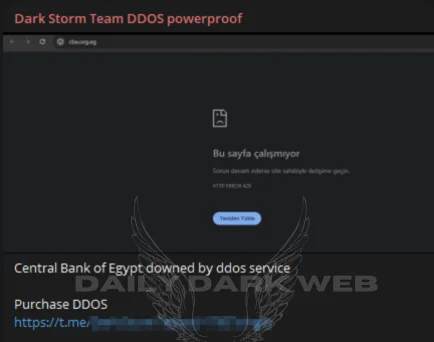In a shocking turn of events, the Central Bank of Egypt fell victim to a massive Distributed Denial of Service (DDoS) attack allegedly orchestrated by the infamous Dark Storm Team. This cyber assault has sent shockwaves through the banking industry and raised concerns about the vulnerability of financial institutions to such attacks. In this article, we will delve into the details of the incident, explore the implications for the banking system in Egypt, and discuss the role of the Dark Web in cybercrime.

The Central Bank of Egypt: A Pillar of the Banking System
The Central Bank of Egypt, as the monetary authority in the country, plays a crucial role in regulating and supervising the banking system. It ensures the stability and soundness of financial institutions, maintains price stability, and supports economic growth. With its important responsibilities, the Central Bank of Egypt is a prime target for cybercriminals seeking to disrupt the country’s financial infrastructure.
Understanding DDoS Attacks
A Distributed Denial of Service (DDoS) attack is a malicious attempt to disrupt the normal functioning of a network, service, or website by overwhelming it with a flood of internet traffic. This flood of traffic is generated by a network of compromised computers, often referred to as a botnet. The aim of such attacks is to render the targeted system unavailable to its users, causing inconvenience, financial losses, and reputational damage.
The Dark Storm Team: Unveiling the Culprits
The Dark Storm Team is a notorious group of cybercriminals known for their involvement in various illegal activities on the Dark Web. This clandestine group operates in the shadows, leveraging the anonymity provided by the Dark Web to carry out their malicious activities. While their identities remain unknown, their actions have gained notoriety in the cybercrime landscape.
The Alleged DDoS Attack on the Central Bank of Egypt
According to reports, the Dark Storm Team allegedly orchestrated a massive DDoS attack on the Central Bank of Egypt. The attack targeted the bank’s online infrastructure, aiming to disrupt its services and create chaos within the financial system. The motive behind the attack remains unclear, but speculations point to possible financial gain, political motives, or simply a demonstration of power by the cybercriminal group.
Implications for the Banking System in Egypt
The DDoS attack on the Central Bank of Egypt has far-reaching implications for the banking system in the country. Firstly, it raises concerns about the overall cybersecurity measures in place to protect financial institutions. The successful execution of such an attack on a prominent institution like the Central Bank highlights the need for robust security frameworks and proactive defense mechanisms.
Moreover, the attack exposes the vulnerabilities of online banking services and the potential risks faced by customers. As more and more individuals rely on digital banking solutions, ensuring the security and integrity of these platforms becomes paramount. The Central Bank of Egypt and other financial institutions must take immediate action to bolster their cybersecurity measures and regain public trust.
A Breeding Ground for Cybercrime
The Dark Web, a hidden part of the internet that requires special tools to access, has become a breeding ground for cybercriminal activities. It serves as a marketplace for illicit goods and services, including hacking tools, stolen data, and even cybercrime-as-a-service offerings. The Dark Storm Team’s alleged involvement in the DDoS attack on the Central Bank of Egypt highlights the role of the Dark Web in facilitating such attacks.
Law enforcement agencies around the world are constantly working to combat cybercrime on the Dark Web. However, the anonymous nature of the platform presents significant challenges in identifying and apprehending cybercriminals. International cooperation and advanced cybersecurity measures are necessary to effectively tackle the growing threat posed by the Dark Web.
Strengthening Cybersecurity Measures
In the wake of the DDoS attack on the Central Bank of Egypt, it has become imperative for financial institutions and organizations to strengthen their cybersecurity measures. This includes implementing robust firewalls, intrusion detection systems, and security information and event management solutions. Regular vulnerability assessments, employee training programs, and incident response plans are also crucial components of a comprehensive cybersecurity strategy.
Collaboration between financial institutions, government agencies, and cybersecurity experts is vital in addressing the evolving threat landscape. Sharing information, best practices, and intelligence can help build a collective defense against cybercriminals. Additionally, public awareness campaigns can educate individuals about the risks associated with cybercrime and the importance of practicing safe online behavior.
Conclusion
The alleged DDoS attack on the Central Bank of Egypt by the Dark Storm Team serves as a wake-up call for the banking industry and cybersecurity professionals alike. It highlights the pressing need for enhanced security measures and proactive defense strategies to safeguard financial institutions and their customers. By fortifying cybersecurity frameworks, raising awareness, and fostering collaboration, we can strive to stay one step ahead of cybercriminals and protect the integrity of our financial systems.








